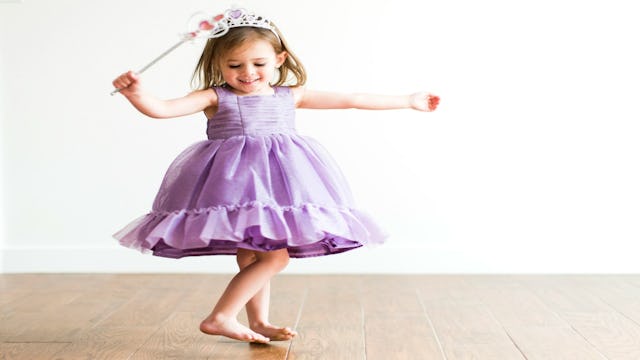Treating Your Daughter Like A Princess Might Cause Anxiety Later In Life

I’ve struggled with an anxiety disorder most of my life, and so when my wife and I decided to have children, I couldn’t help but be anxious about passing it on. And I know, I know, those of you reading this might find it ironic that a person with an anxiety disorder would have anxiety about passing on their anxiety, but ultimately that’s how this whole thing works. Anxiety tends to feed on itself, and that is ultimately what makes it so difficult to live with. It also tends to make for hyper-attentive parenting.
I have three children — ages 10, 8, and 3 — and I watch them pretty closely. In the back of my mind, I often wonder if they are starting to show signs of the condition. I think any parent with anxiety or depression probably does the same thing. And like all parents with or without an anxiety disorder, I watch to make sure my children are safe.
But, according to a recent Australian and Dutch study, watching your children that closely, and treating them so gingerly, might actually be causing them future anxiety.
Researchers from Macquarie University’s Centre for Emotional Health, along with partners from the University of Amsterdam and the University of Reading, surveyed 312 families with preschool-aged children across the Netherlands and Australia.
What they found was that parents who used Challenging Parent Behavior, or CPB, had kids whose anxiety levels were significantly less than others. Researchers described CPB as “encourag[ing] safe risk-taking in children such as giving them a fright and engaging in rough-and-tumble play…”
As a father of two girls and one boy, when I read this study, I think about the fact that I treat my daughters differently than my son. Tristan and I don’t have all that much trouble with rough and tumble play. It’s not necessarily intentional, but ultimately, my son is much more interested in trying to tackle me in the living room, while my daughters are much more interested in approaching me with a wand and turning my pumpkins into stag coaches so we can attend a ball. My girls love Disney Princesses whereas my son loves video games with the main goal of beating someone up. And, as a result, I have a difficult time not approaching play with my daughters softly.
But the reality is, what is all this doing to my daughter’s future mental health?
According to a second study performed by the University of Newcastle, my assumption that my daughters only want to play princesses is incorrect. Professor Richard Fletcher, a co-author of the study, found that daughters “liked rough-and-tumble play as much as their sons” and the “dads were often pleasantly surprised” by this.
In fact, many fathers, myself included, “…realized they’d been treating them like princesses.”
I’ll be the first to admit, this gave me pause. I enjoy playing princess with my daughters, but I don’t usually assume that they want to wrestle around the living room like I do with my son. There are probably a million reasons for this, but after reviewing both studies, I’m starting to realize that I was wrong. Perhaps they not only want to engage in rough and tumble play, but it also might be good for their future mental heath.
Now, keep in mind, the second study mostly looked at fathers’ relationships with their daughters. But there is no reason a mother cannot get into rough and tumble play with any of their children. In fact, I’ve seen my wife do a pretty gnarly job at pinning my son and giving him a wet willy, so I know that mothers can roughhouse with the best of them. There really is no reason that the rough and tumble play obligation should only be on the fathers’ plate.
That said, next time I’m roughhousing with my son on the sofa and my daughters enter in a princess play dress, I’m going to ask them to join. I might even ask my wife to join, too. I’m going to tell the girls that their brother is a dragon and I need their help in defeating it. Because the fact is, I don’t want to change what they are into. I don’t want to try to dictate that they can’t play princesses, because that’s still something they enjoy.
But if there is some way to include what they enjoy while engaging them in more rough and tumble play, I’m going to try it out. And I’m sure my son will roll his eyes because he’s too cool for princesses, but once we are all giggling on the floor, wresting, I feel confident that none of that will matter.